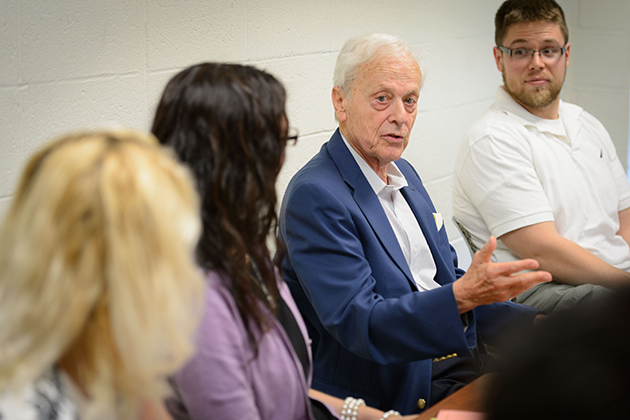UConn’s School of Social Work will introduce a Bachelor’s of Social Work program in the fall of 2018 that will complement the master’s and doctoral degrees the school already offers.
The Board of Trustees voted to approve the proposal today, making UConn the first public university in the state to have all three social work degrees, says Lisa Werkmeister-Rozas, an associate professor of social work and co-chair of the exploratory committee.
The BSW program will enhance the visibility and reputation of UConn’s School of Social Work, she says, and it responds to a workforce need in Greater Hartford and the state overall. It would also expand the pool of undergraduates moving onto graduate level social work programs, which in turn will provide more graduate assistants and adjunct teaching opportunities for doctoral students in the field. And it will give undergraduates who have taken courses or who have an interest in education, psychology, sociology, and allied health the option of majoring in social work.
The need for social workers is especially acute in schools, Werkmeister-Rozas says. An undergraduate wanting to pursue that specialty could incorporate courses at Neag School of Education. Or, if they want to work in a hospital setting, say with oncology patients or in a transplant program, students can integrate courses in Allied Health Sciences, part of the College of Agriculture, Health, and Natural Resources.
““We think that we can build a very strong interdisciplinary BSW program working with other departments and programs in CLAS, Neag, and allied health,” says Werkmeister-Rozas, adding that the School of Social Work already has many graduate students who majored in those units. “Developing a BSW program is a great opportunity for students, particularly as practice-based and interdisciplinary education becomes more critical to students’ future career development.”
The School of Social Work moved in early May from UConn’s West Hartford campus to a newly renovated building at 38 Prospect St. in Hartford. The building is about a block away from UConn’s new Hartford campus, and school officials envision the new program being one of its signature programs, Werkmeister-Rozas says.
Undergraduate majors would be able to take all their courses at that one location, she says. It is close to a number of Hartford institutions where undergraduates will have opportunities for internships and field placements. The school is already placing its graduate students in family assistance centers and alternative education programs in Hartford Public Schools. Work is underway to develop new opportunities through the Charter Oak Cultural Center and Hartford Public Library, which provides programs and services to immigrants and refugees.
“We’re going to be very aware of the things that these programs offer, and we can talk to BSW students about what might be helpful in enhancing their knowledge in a particular area,” Werkmeister-Rozas says.
The program will start out small with about 25 students in the first year, she says, with another 25 students to be added in 2019. The School of Social Work currently has an enrollment of about 400 students in its various programs, which also include non-degree programs for students who have not yet matriculated and professionals seeking continuing education credits.
Pursuing a master’s degree for students who majored in psychology, sociology, family studies, and similar disciplines currently takes two years. Students in the BSW program will be able to earn an MSW in one year, she says.
Connecticut has a number of public and private colleges that offer bachelor’s degrees in social work, including The University of St. Joseph, Quinnipiac University, and Eastern, Western, and Southern Connecticut state universities. UConn is the largest public institution in the state to offer a bachelor’s degree of social work, and the one with the highest admission requirement.
By having all three degree programs, UConn is able to expose students to a broader view of what social work entails, says Werkmeister-Rozas.
“I think it gives students a greater vision of what social work can be, from a bachelor’s to Ph.D.,” she says. “It’s an important thing for people going into the profession to have a better understanding of the opportunities that lie within the overall profession of social work.”



